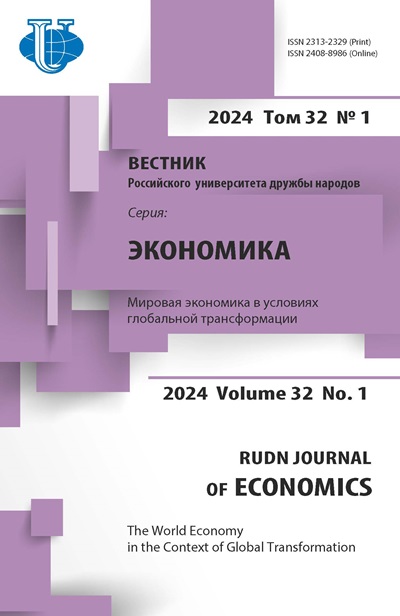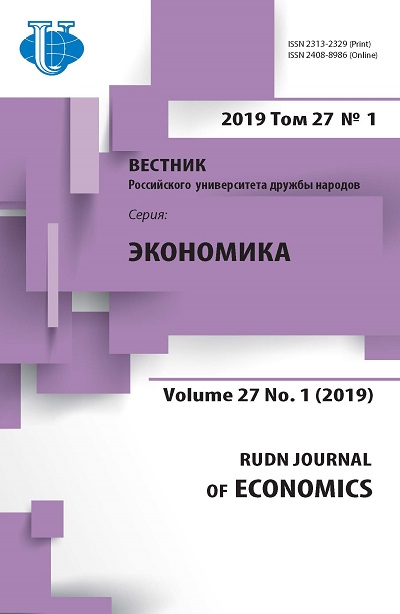Service sector (services) key features of Russia and Azerbaijan
- Authors: Savlov M.E.1
-
Affiliations:
- Institute for Complex Strategic Studies
- Issue: Vol 27, No 1 (2019)
- Pages: 18-34
- Section: ECONOMIC GROWTH AND SOCIO-ECONOMIC DEVELOPMENT
- URL: https://journals.rudn.ru/economics/article/view/21298
- DOI: https://doi.org/10.22363/2313-2329-2019-27-1-18-34
Cite item
Full Text
Abstract
The presented article gives a general description of the sphere of non-material production of Russia and Azerbaijan, which is based on the key macroeconomic indicators. The internal heterogeneous structure of the sector is also illustrated, structural features of the service sector and its individual segments in both countries are revealed. The objectivity and adequacy of the sphere characteristics of non-material production of Russia and Azerbaijan is based on intercountry comparisons. Macroeconomic indicators of main developed countries (the USA, Japan, Germany, France, the United Kingdom), the BRICS countries and the former Soviet republics serve as a background for the illustration of the service sectors of Russia and Azerbaijan. It is too early to refer Russia and Azerbaijan to post-industrial countries, even considering only one economic parameter - the structure of the economy. Considering the gross value added (GVA) of the service sector per capita in current prices and the GVA of the service sector per capita in constant 2010 prices, Russia and Azerbaijan lag behind the leading economies of the world, some BRICS countries and even some former republics of USSR. In this regard, the study of the sphere of intangible production is not so popular in Russia and Azerbaijan, as the economic background for the actualization of these studies has not been yet created.
About the authors
Mikhail E. Savlov
Institute for Complex Strategic Studies
Author for correspondence.
Email: savlm@yandex.ru
Specialist of Analytical Department at Institute for Complex Strategic Studies
23 Bolshaya Polyanka St., bldg. 1, Moscow, 119180, Russian FederationReferences
- Achkasova T.A. (2013). Geografiya tretichnogo sektora [Geography of tertiary sector]. Sotsial’noekonomicheskaya geografiya: ponyatiya i terminy: slovar’-spravochnik. A.P. Gorkin (ed.). Smolensk: Oykumena Publ., 65. (In Russ.)
- Bell D. (2004). Gryadushcheye postindustrial’noye obshchestvo: opyt sotsial’nogo prognozirovaniya [The coming post-industrial society: the experience of social forecasting]. 2nd ed. Moscow: Academia. (In Russ.)
- Bolatov M.O., Savlov M.E. (2016). Rol’ federal’nykh zemel’ i gorodov v formirovanii tretichnogo sektora ekonomiki Germanii [The role of the federal states and cities in the formation of the tertiary sector of the German economy]. Regional’nyye issledovaniya, 1(51), 37-48. (In Russ.)
- Christaller W. (1966). Central Places in Southern Germany. Carlisle W. Baksin (transl.). Englewood Cliffs, NJ: Prentice Hall.
- Daniels P.W. (2006). On services and economic geography. H. Lawton-Smith and S. Bagchi-Sen (eds.) Economic Geography: Past, Present and Future. New York. Routledge, 112-124.
- Daniels P.W. (2004). Reflection on the “old” economy, “new” economy, and services. Growth and Change, (35-2), 115-137.
- Daniels P.W. (1985). Service Industries: A Geographical Appraisal. London: Methuen.
- Daniels P.W. (1993). Service Industries in the World Economy. IBG Studies in Geography. Oxford: Blackwell.
- Gadzhizade M.E. (2015). Faktory formirovaniya informatsionnogo obshchestva i tendentsiiy ego razvitiya v Azerbaydzhane [Factors of the formation of the information society and its development trends in Azerbaijan]. Ekonomika i predprinimatel’stvo, 8-2(61-2), 432-440. (In Russ.)
- Gandilova S.T. (2014). Rol’ turizma v ekonomike Azerbaydzhana [The role of tourism in the economy of Azerbaijan]. Vestnik Natsional’noy akademii turizma, 4(32), 37-39. (In Russ.)
- Gasanov A.N. (2013). Turizm v Azerbaydzhane - vazhneyshaya otrasl’ razvitiya regional’noy ekonomiki [Tourism in Azerbaijan is the most important branch of development of the regional economy]. Ekonomika i predprinimatel’stvo, 10(39), 126-128 (In Russ.)
- Gorkin A.P. (2007). Postindustrial’nost’ ekonomiki stran mira [Post-industrial economy of the world]. Vestnik Moskovskogo universiteta. Seriya 5: Geografiya, (5), 3-9. (In Russ.)
- Gubadova A.A. gyzy. (2017). Vliyaniye razvitiya neneftyanogo sektora na ekonomiku Azerbaydzhana [Impact of the development of the non-oil sector on the economy of Azerbaijan]. Rossiyskoye predprinimatel’stvo, 18(12), 1861-1866. (In Russ.)
- Guseyn A.A. (2017). Vliyaniye lechebnogo turizma na ekonomiku Azerbaydzhana [The impact of medical tourism on the economy of Azerbaijan]. Servis v Rossiii za rubezhom, 6(76), 32-40. (In Russ.)
- Gyul’aliyev M.G., Manafova E.K. (2013). Osnovnyye svoystva mezhdunarodnykh obrazovatel’nykh uslug v Azerbaydzhane [The main properties of international educational services in Azerbaijan]. Ekonomika obrazovaniya, (4), 111-115. (In Russ.)
- Illeris S. (1996). The Service Economy: A Geographical Approach. Chichester, UK: Wiley.
- Imanov N.D. ogly. (2011). Problemy, perspektivy i realii strakhovogo rynka Azerbaydzhana v sovremennykh usloviyakh [Problems, prospects and realities of the insurance market of Azerbaijan in modern conditions]. Rossiyskoye predprinimatel’stvo, (9-2), 147-152. (In Russ.)
- Inozemtsev V.L. (2001). Postindustrial’noye khozyaystvo i “postindustrial’noye” obshchestvo (k probleme sotsial’nykh tendentsiy XXI veka) [Post-industrial economy and “post-industrial” society (to the problem of social tendencies of the XXI century)]. Obshchestvennyye nauki i sovremennost’, (3), 140-152. (In Russ.)
- Inozemtsev V.L. (2000). Sovremennoye postindustrial’noye obshchestvo: priroda, protivorechiya, perspektivy: uchebnoe posobiye dlya studentov ekonomicheskikh napravleniy i spetsial’nostey [Modern post-industrial society: nature, contradictions, perspectives: manual for students of economic directions and specialties]. Moscow: Logos Publ. (In Russ.)
- Kastel’s M. (2000). Informatsionnaya epokha: ekonomika, obshchestvo i kul’tura [Information Age: Economy, Society and Culture]. Moscow: GU VSHE Publ. (In Russ.)
- Katrovskiy A.P. (2013). Transformatsiya vysshego obrazovaniya na postsovetskom prostranstve: ekonomiko-geograficheskiye aspekty izucheniya [Transformation of higher education in the postSoviet space: economics-geographical aspects of the study]. Regional’nyye issledovaniya, (4), 19-30. (In Russ.)
- Kerimov A.E. ogly. (2011). Roznichnyy biznes kommercheskikh bankov v Azerbaydzhanskoy respublike [Retail business of commercial banks in the Republic of Azerbaijan]. Bankovskiye uslugi, (12), 28-36. (In Russ.)
- Kruzhalin V.I., Mironenko N.S., Zigern-Korn N.V., Shabalina N.V. (2014). Geografiya turizma: uchebnik [Tourism geography: textbook]. Moscow: Federal’noye agentstvo po turizmu. (In Russ.)
- Kruzhalin V.I., Kiyakbayeva E.G. (2017). Sovremennyye problem i tendentsii v rossiyskom turizme [Current problems and trends in Russian tourism]. Geograficheskiy vestnik, (4), 146-153. (In Russ.)
- Kruzhalin V.I., Kruzhalin K.V., Shabalina N.V. (2016). Sostoyaniye rossiyskogo turizma, problem i perspektivy [The state of Russian tourism, problems and prospects]. Vestnik Natsional’noy akademii turizma, 1(37), 10-13. (In Russ.)
- Luzanov A.N. (2002). Geografiya bankovskoy deyatel’nosti [Banking Geography]. Moscow: Maks-Press Publ.
- McKee D. (2008). Services, growth poles and advanced economies. Service Business, (2-2), 99-107.
- Mekhdiyev S.M. (2009). Razvitiye rynka lizingovykh uslug v stroitel’stve Azerbaydzhana [Development of the leasing market in the construction of Azerbaijan]. Problemy ekonomiki, (3), 47-49. (In Russ.)
- Rodionova I.A. (2014). Ekonomicheskaya i sotsial’naya geografiya mira: uchebnik dlya bakalavrov [Economic and social geography of the world: a textbook for bachelors]. Moscow: Yurayt Publ. (In Russ.)
- Savlov M.E. (2013). Makrogeograficheskiye osobennosti tretichnogo sektora mirovoy ekonomiki [Macrogeographical features of the tertiary sector of the world economy]. Vestnik Moskovskogo universiteta. Seriya 5: Geografiya, (2), 19-24. (In Russ.)
- Savlov M.E. (2018). Metodika otsenki struktury tretichnogo sektora khozyaystva stran mira [Methods for assessing the structure of the tertiary sector of the world economy]. Izvestiya Rossiyskoy akademii nauk. Seriya geograficheskaya, (1), 21-30. (In Russ.)
- Schumpeter J.A. (1961). The theory of economic development. New York: Oxford University Press.
- Shaverina L.A. (2010). Formirovaniye rynka meditsinskikh uslug v Azerbaydzhane [Formation of the medical services market in Azerbaijan]. Voprosy ekonomicheskikh nauk, 2(41), 120-125. (In Russ.)
- Sivitskiy A.V. (1998). Terminologicheskiye problem geografii sektora uslug [Terminological problems of the geography of the service sector]. Vestnik Moskovskogo universiteta. Seriya 5: Geografiya, (2), 18-22. (In Russ.)
- Stigler G.J. (1956). Trends in Employment in the Service Industries. Princeton, NJ: Princeton University Press.
- Sushchinskaya M.D. (2013). Sovremennoye sostoyaniye razvitiya turizma na prostranstve SNG [The current state of tourism development in the CIS space]. Izvestiya Sochinskogo gosudarstvennogo universiteta, 3(26), 91-96. (In Russ.)
- Tarkhov S.A. (2018). Transportnaya osvoyennost’ territorii [Transport development of the territory]. Vestnik Moskovskogo universiteta. Seriya 5: Geografiya, (2), 3-9. (In Russ.)
- Vasil’yeva O.E. (2010). Razvitiye sfery uslug kak factor migratsii naseleniya (na primere Respubliki Bashkortostan) [Development of the service sector as a factor of population migration (on the example of the Republic of Bashkortostan)]. Regional’nyye issledovaniya, 4(30), 32-35. (In Russ.)
- Vol’skiy V.V. (2009). Izbrannyye sochineniya [Selected Works]. A.S. Fetisovai et al. (eds). Smolensk: Oykumena Publ. (In Russ.)
- Voskolovich N.A. (2016). Mezhdistsiplinarnyy aspect sovremennykh issledovaniy v sfere turizma [Interdisciplinary aspect of modern research in the field of tourism]. Vestnik Moskovskogo universiteta. Seriya 6: Ekonomika, (6), 71-86. (In Russ.)
- Voskolovich N.A. (2018). Osobennosti razvitiya ekologicheskogo turizma v Rossii [Features of the development of ecological tourism in Russia]. Vestnik Moskovskogo universiteta. Seriya 6: Ekonomika, (3), 109-123. (In Russ.)
- Voskolovich N.A. (2017). Problemy razvitiya torgovli v sovremennoy Rossii [Problems of trade development in modern Russia]. Vestnik Sibirskogo universiteta potrebitel’skoy kooperatsii, 2(20), 3-12. (In Russ.)
- Voskolovich N.A., Zhil’tsov E.N. (2017). Spetsifika razvitiya sel’skogo turizma v Rossii [The specifics of the development of rural tourism in Russia]. Vektor nauki Tol’yattinskogo gosudarstvennogo universiteta. Seriya: Ekonomika i upravleniye, 2(29), 22-30. (In Russ.)
- Voskolovich N.A. (2017). Ekonomika platnykh uslug: uchebnik i praktikum dlya bakalavriata i magistratury [Economics of paid services: a textbook and a workshop for undergraduate and graduate programs]. 3nd ed. Moscow: Yurayt Publ. (In Russ.)
- Zubarevich N.V. (2013). Geografiya sektora uslug: novyye vyzovy [Service sector geography: new challenges]. Geografiya naseleniya i sotsial’naya geografiya. Voprosy geografii, 135. A.I. Alekseyev, A.A. Tkachenko (eds.). Moscow: Kodeks Publ., 483-491. (In Russ.)
- Zubarevich N.V. (2010). Goroda kak tsentry modernizatsii ekonomiki i chelovecheskogo kapitala [Cities as centers for the modernization of the economy and human capital]. Obshchestvennyye nauki i sovremennost’, (5), 5-19. (In Russ.)
- Zubarevich N.V. (2013). Transformatsiya sel’skogo rasseleniya i seti uslug v sel’skoy mestnosti [Transformation of rural settlement and service network in rural areas]. Izvestiya Rossiyskoy akademii nauk. Seriya geograficheskaya, (3), 26-38. (In Russ.)















